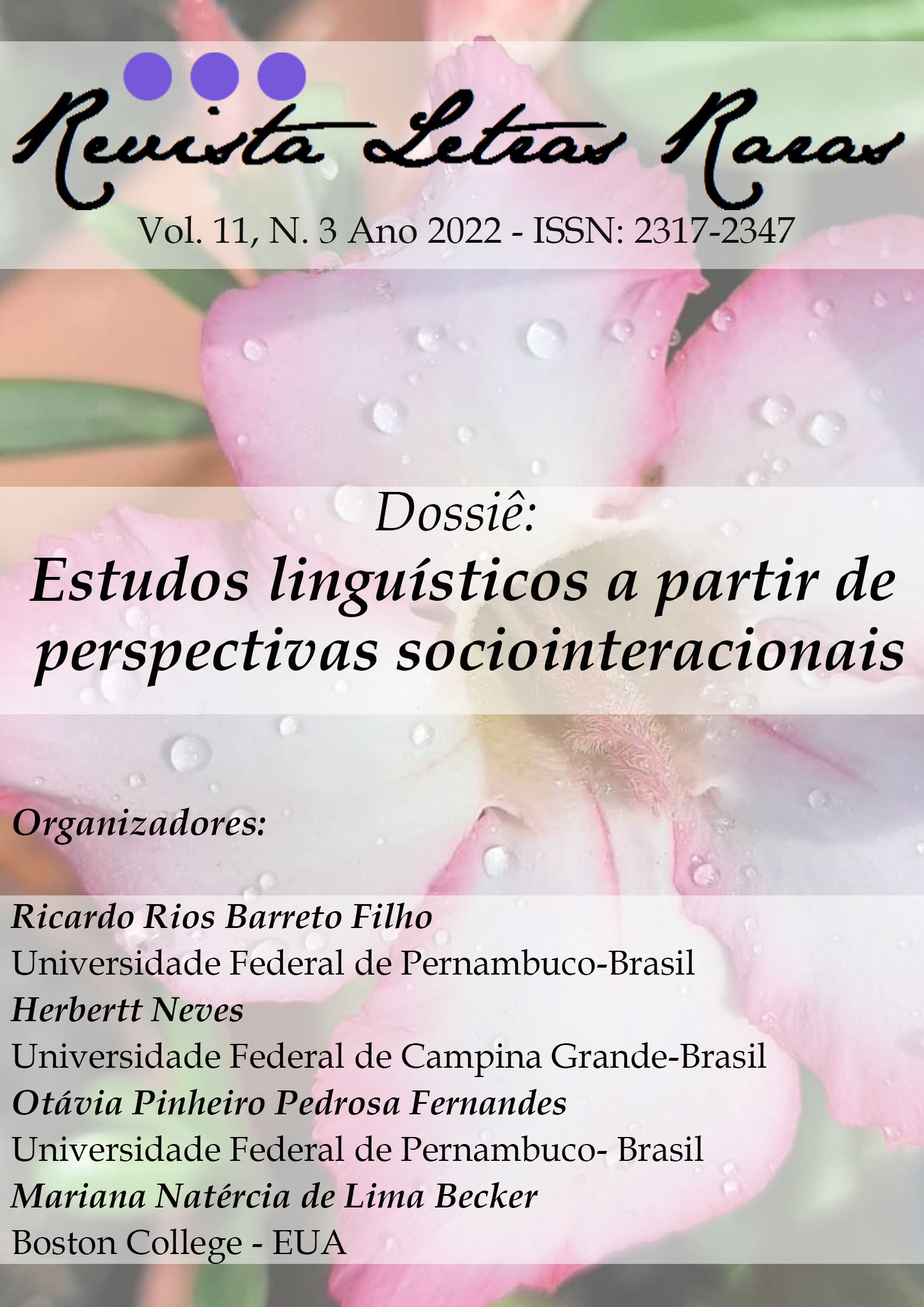Slam: an analysis of discourse through ideological and discursive formations
DOI:
https://doi.org/10.5281/zenodo.8152522Keywords:
Analysis of the french discourse, Slam, Discursive and ideological formationAbstract
This study aims to mobilize a discursive analysis about the slam "The girl who was born without color", in order to bring to light prejudiced petrification resonances about blackness, but, above all, to show the important role of discursive resistance to these enduring senses, through the theoretical-methodological contributions of the French Line Discourse Analysis (hereinafter AD), supported by the writings of his forerunner Pêcheux and in Brazil by Orlandi. The corpus of this analysis is based on the slam "The girl who was born without color" of slammer Midria Silva, which can be viewed on YouTube (https://youtu.be/o6zEZP7pudQ), or in her book of the same title of the slam addressed; declaimed in a discursive event of poetry slam in which poets or rather slammers compete with each other in a battle with social themes that usually denounce something that concerns them, having as resources only the voice and the body. Therefore, for the analysis, the concept of discursive and, consequently, ideological formation is essential to understand the discursive functioning of the genre and through gestures of interpretation to understand why it is a discursive that not only reproduces, but resists and transforms perpetuized concepts, since it "screams" for a resignifying of senses crystallized by the dominant ideology, that is, it is born from the class struggle, constitutive to every discourse – resistance.
Downloads
References
A MENINA QUE NASCEM SEM COR. Autoria: Midria Silva. 2018. 1:31: Disponível em: https://youtu.be/o6zEZP7pudQ. Acesso em: 28 de fevereiro de 2022.
BAHKTIN, M. Gêneros do discurso. In: Estética da criação verbal. Trad. Paulo Bezerra. 6.ed. São Paulo: Martins Fontes, 2011.
BERSANI, H. Aportes teóricos e reflexões sobre o racismo estrutural no Brasil. Extraprensa, São Paulo, v. 11, n. 2, p. 175 – 196, jan./jun. 2018.
BALBINO. J. Oralidade, Voz e Literatura feita por mulheres periféricas. In: Mulheres em discurso. São Paulo. p.162-182, 2016. MOITA LOPES, L. P. (Org.) Por uma Linguística Aplicada Indisciplinar. São Paulo: Parábola Editorial, 2006.
NEVES, C. A. de B. Slams – Letramentos literários de reexistência ao/no mundo contemporâneo. Linha D'Água (Online), São Paulo, v. 30, n. 2, p. 92-112, out. 2017.
ORLANDI. E. P. Análise de Discurso e Interpretação. In: Discurso e Texto: formação dos sentidos. Campinas, São Paulo: Pontes, 2001. p. 19-29.
ORLANDI. E. P. As formas do silêncio: no movimento dos sentidos. 6ªed. Campinas, SP: Editora da Unicamp, 2007.
ORLANDI. E. P. Análise de discurso: princípios e procedimentos. Campinas: Pontes, 2009.
ORLANDI. E. P. Discurso em Análise: Sujeito, Sentido e Ideologia. 2 ed. Campinas, SP: Pontes Editores, 2012.
PÊCHEUX, M. A análise de discurso: três épocas. In: GADET, F.; HAK, T. (org.). Por uma análise automática do discurso: uma introdução à obra de Michel Pêcheux. Campinas,SP: Editora da Unicamp, 1993 [1983].
PÊCHEUX, M. O discurso: estrutura ou acontecimento. Tradução: Eni Puccielli Orlandi. 5ª ed. Campinas: SP: Pontes Editores, 2008.
PÊCHEUX, M. Semântica e discurso: crítica à afirmação do óbvio. Tradução: Eni Puccinelli Orlandi et al. 5ª ed. Campinas, São Paulo: Editora da UNICAMP, 2014.
PÊCHEUX, M. Análise de Discurso. In: ORLANDI, Eni P. Textos selecionados. 4ª ed. Campinas: Pontes Editores, 2016.
PÊCHEUX, M. Análise Automática do Discurso. Tradução: Eni Puccinelli Orlandi e Greciely Costa. Campinas, São Paulo: Pontes Editores, 2019.
Downloads
Published
How to Cite
Issue
Section
License
Copyright (c) 2023 Revista Letras Raras

This work is licensed under a Creative Commons Attribution-NonCommercial 4.0 International License.







